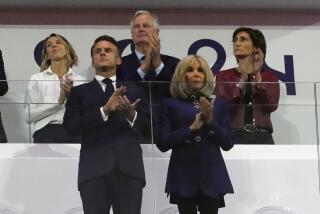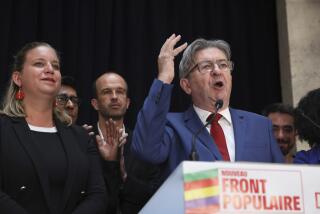French slums key to presidential vote?
ARGENTEUIL, FRANCE — It is ironic that Nicolas Sarkozy, the front-runner in France’s presidential race, finds himself on the defensive in the immigrant slums that could play a key role in today’s first-round election.
As France’s top law enforcement official, the hard-charging Sarkozy spent a lot of time in the nation’s tense housing projects. As a streetwise descendant of Hungarian and Greek-Jewish immigrants, he has a better instinctive understanding of those areas than most politicians, even some of his critics say.
But just before the riots that shook France in October 2005, Sarkozy paid a nocturnal visit to a grim housing project in this industrial city on the northwest periphery of Paris. When a young mob hurled objects and insults at him, he responded with characteristically tough talk. Ever since, he has been the nemesis of restive street gangs -- and the target of political rivals who call him dangerously divisive.
Whether or not the accusation is fair, Sarkozy has largely avoided housing projects during the campaign for fear of new unrest or a politically damaging sound bite. His opponents have exploited that vulnerability by campaigning in immigrant areas, where registration increased during the last year.
New voters in the traditionally leftist bastions could help determine a tight race in which center-rightist Sarkozy, Socialist Segolene Royal, centrist Francois Bayrou and far-rightist Jean-Marie Le Pen lead a field of 12 candidates in today’s voting. A runoff is scheduled for May 6.
“It’s true that after the riots of 2005, many young people accepted our appeal,” said local Socialist leader Ali Romdhane, a former city council member who led a drive here that registered 7,200 new voters, a 15% increase.
“In a way, Sarkozy helped us. Our slogan was, ‘Vote instead of vandalize.’ We told the young people that their strength rested in their voter identification card. And they are the ones who are going to make the difference.”
But Sarkozy’s rivals may be simplifying matters. The 52-year-old has won admirers on France’s toughest streets precisely because of his plain-spoken, pugnacious attitude and his crime-fighting record as interior minister, experts say. And his feud with a relatively small population of youths enhances his popularity with older, more conservative voters, they say.
“There’s a rupture between him and the immigrant youth, but overall the political forces in the banlieues are more balanced than you would think,” said a veteran police intelligence official who asked not to be named, using the French term for areas on the urban periphery that typically contain industrial housing projects. “Sarkozy does well with a population, whether French or North African, that wants security restored in the housing projects. He’s responsible for the rupture with the kids, but he also benefits from it.”
Although the police official disagrees with Sarkozy’s politics, he said the candidate is one of the few leaders with a keen insight into the brew of crime, poverty, alienation and Islamic extremism in the slums. Sarkozy resigned as interior minister recently to run for president.
A pro-Sarkozy youth leader in Argenteuil said he respects the candidate because he has a long record of visiting underprivileged areas, where he emphasizes hard work, upward mobility and equal opportunity.
“What happened here with the youths who want to derail Nicolas Sarkozy is not representative of what’s happening in the banlieues,” said Tarek Moudane, 27, who leads a local youth association called Blue, White and Red. “In fact, those were youths who don’t vote and don’t have the slightest notion of the political world. I’ve got kids who come to see me at the association and say, ‘Yeah, we like Sarkozy,’ but a lot don’t want to say it loud. But they tell us that he’s the only gentleman who can get France going.”
The voter registration drive, which in the Paris area featured rap music stars, began as an anti-Sarkozy initiative. But it soon widened to include newly naturalized citizens and other adults who had never voted, officials said.
Nationwide, voter registration has increased from about 41 million to 45 million since the last presidential vote in 2002. There is great interest in an election likely to bring a new generation to power and, as Romdhane put it, “change the political configuration” of a society mired in malaise.
Sarkozy apparently has a strong lead and is expected to qualify with ease for the runoff, according to most polls and political analysts. Royal is likely to come in second, setting up a showdown between the two biggest parties, the polls suggest.
But no one rules out surprises. Many voters remain undecided, pollsters say. The first-round electorate is volatile and inclined to cast protest votes. Five years ago, the hapless Socialists were upset by Le Pen, who then lost to the center-right.
Le Pen retains a solid following with his angry rhetoric about defending France against immigrants, foreign economic competition and the European bureaucracy. But this year’s wild card apparently is Bayrou. A former education minister of the center-right, he attracts moderate leftists with promises of a tolerant, pragmatic government that transcends ideology. Bayrou drew an impressive crowd of 17,000 to a rally Wednesday in Paris.
“The surprise is Bayrou,” acknowledged Romdhane, the local Socialist leader, who during an interview in a cafe withstood ribbing from a North African cook about Bayrou’s strength. “He plays on both fields and takes advantage of the indecision of the citizens. There is disillusionment with all the institutions.”
Bayrou has challenged Royal in industrial immigrant neighborhoods, but he lacks the entrenched working-class networks of the Socialists and six far-left candidates.
Royal, meanwhile, has had to fend off the perception that her inexperience and gaffes on foreign policy issues weakened her and fomented divisions in her party. Two popular Socialist leaders went as far as urging her to consider an alliance with Bayrou.
Socialist operatives predict that the left will dig in to avoid a catastrophic repeat of its elimination in 2002. The strategy has relied heavily on Internet appeals to young voters resentful of the center-right on issues such as unemployment and urban unrest. Sarkozy’s opponents accuse him of stigmatizing the young and pandering to the extreme right. They cite the 2005 incident here when he described his hecklers as racaille, a term used commonly by police officers that means “rabble” or “thugs.”
“Those words have been inscribed in marble,” Romdhane said. “It will take years for them to fade away.”
Nonetheless, Sarkozy defended himself with aplomb recently in the industrial suburb of Mieux during a rare visit to a minority neighborhood.
He reminded his audience of an often-ignored fact about the Argenteuil confrontation. In an explanation confirmed by footage and witness accounts, Sarkozy said he used the word “thugs” in response to a “woman of North African origin” who had leaned out a window to ask whether he could “get rid of the thugs” who were causing trouble in the housing project.
“I very much intend to continue calling a thug a thug and a hoodlum a hoodlum,” Sarkozy said. “It’s not a word that’s insulting -- what’s insulting is the conduct of someone who acts like a hoodlum. I never said that all the residents of Argenteuil were hoodlums.”
Moudane, the youth leader, was at the scene in Argenteuil that night and backs Sarkozy’s account. He said Sarkozy has convinced him he cares about disadvantaged young people.
“I don’t think he would ever mix the words ‘youth’ and ‘thugs,’ ” Moudane said. “We have worked with him for two years and we are kids from the neighborhood. I don’t have a diploma ... and I have a real relationship with him.”
If the runoff campaign during the next two weeks matches Sarkozy against a challenger on his left, the banlieue issue and vote will be more urgent than ever. Sarkozy will feel intense pressure to venture into the disputed turf to disprove opponents who say he is persona non grata there.
And the candidate might even decide to make good on his promise to return to Argenteuil, which could once again become an open-air political stage. Even Le Pen campaigned in the housing project to mock Sarkozy, though he made a hasty visit at 10 a.m. when hard-core toughs were unlikely to be hanging out, or even awake.
“Politically, I think he’ll feel obligated to go, whether to Argenteuil or another neighborhood,” the veteran police intelligence official said of Sarkozy. “The problem is that youths all over those areas are determined to create problems for him if he does.”
Achrene Sicakyuz in The Times’ Paris Bureau contributed to this report.
*
(BEGIN TEXT OF INFOBOX)
Leaders in the race to be chief of state
Francois Bayrou
Party: Union for French Democracy
Age: 55
Personal: Grew up in a farming family in southwest France. Married Elisabeth Perlant in 1971; they have six children. Catholic.
Education: University of Bordeaux, classical studies, 1970-74
Career highlights: Taught Greek and Latin. Worked for the minister of agriculture and the president of the Senate. First elected to Parliament in 1986. Served as minister of education, 1993-97. Became president of his party in 1998. Ran for president of France in 2002, receiving 6.8% of the vote.
Campaign: Advocates a “third way” between political extremes. Proposes a national unity government made up of moderates from left and right.
---
Jean-Marie Le Pen
Party: National Front
Age: 78
Personal: Born into a family of fishermen on the Brittany coast. Married Pierrette Lalanne in 1960 and had three children. Divorced.
Education: College des Jesuites St.-Francois-Xavier in Vannes; University of Paris law school.
Career highlights: Served in the French Foreign Legion in Algeria and French Indochina. First elected to the National Assembly in 1956. Formed the right-wing National Front in 1972. Has run for president four times, making the runoff in 2002. Convicted in 1998 of assaulting a political rival and banned from holding public office for two years. In 1987, described the Holocaust as a “detail of history.”
Campaign: Immigration is his main issue. Advocates more prisons, abolishing inheritance tax and renegotiating European treaties.
---
Segolene Royal
Party: Socialist
Age: 53
Personal : Born in Senegal. Has four children with her partner, Socialist Party Chairman Francois Hollande.
Education: Notre-Dame d’Epinal boarding school. National Foundation of Political Science; National School for Administration.
Career highlights: Served in various government posts, including as minister of the environment and in the department of education. Elected president of the Poitou-Charentes Regional Council in 2004, equivalent to a governor.
Campaign: A non-ideological Socialist and a champion of family values. Considered the first woman with a realistic chance to win the presidency.
---
Nicolas Sarkozy
Party: Union for a Popular Movement
Age: 52
Personal: Born in Paris to a French mother and to a Hungarian father who had fled the Russian advance in 1944. Grew up in an affluent suburb. Married twice, he and current wife Cecilia Ciganer-Albeniz have one child, and he has two others.
Education: University of Paris. Institute of Political Studies. Passed the bar in 1981.
Career highlights: Elected city councilor in Neuilly and later mayor. Helped negotiate a hostage crisis at a nursery school. National government posts included budget minister, interior minister and finance minister. Before riots in Paris’ gritty suburbs in 2005, he called youths “thugs”; critics accused him of fueling the violence.
Campaign: Issues include law and order, a tougher stance on immigrants and relaxing rules on hiring and firing.
Sources: Agence France-Presse; Who’s Who in European Politics; Who’s Who in the World; Who’s Who; The Times of London; Encyclopedia Britannica; Times research.
More to Read
Sign up for Essential California
The most important California stories and recommendations in your inbox every morning.
You may occasionally receive promotional content from the Los Angeles Times.










